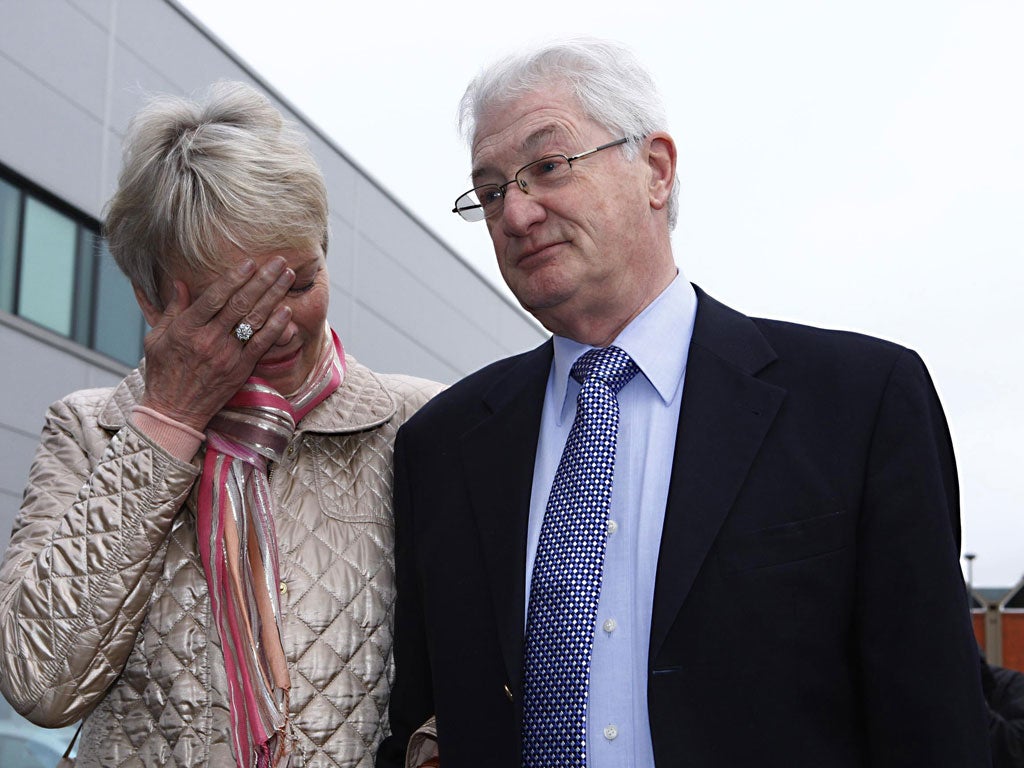Tears from his wife as extradited businessman heads to Texan jail
Retired Briton accused of arms dealing says he has fewer rights than Abu Qatada

Handcuffed between two US marshals, the retired businessman Christopher Tappin was flown to America yesterday, protesting he would have more rights to fight extradition if he were a terrorist.
The 65-year-old, who remains adamant that arms dealing charges he faces in the US are "frivolous" and he is simply a victim of entrapment, could be sentenced to 35 years in jail if convicted.
Over the last few days, having lost his two-year battle against extradition, he has spent his time fixing his five-year-old grandson's bike seat and hosting farewell drinks at his golf club, "philosophical" he may never see his native country again.
Yesterday, as he arrived at Heathrow to board the flight to Texas, he described his extradition under the controversial UK-US treaty as a "disgrace" and blamed David Cameron for failing him at a time when the radical cleric Abu Qatada has been allowed to stay in Britain after European courts blocked the Government's attempts to deport him.
With his tearful 62-year-old wife Elaine beside him, he admitted he was full of trepidation for what lay ahead. The immediate future is likely to be an El Paso jail, pending a bail hearing at the US court on Monday.
Mr Tappin expects his experience of jail to be "vivid and barbaric" and envisages having to join a prison gang for protection. Mr Tappin said: "I have no rights. Abu Qatada is walking the streets of London today and we cannot extradite him. If I were a terrorist, I would not be going to America. I think it's a disgrace.
"The Conservative government, while in opposition, promised to reform the law and they failed to do so. They've let me down; they've let the whole country down."
The retired shipping agent and former president of the Kent Golf Union, from Orpington, denies attempting to sell batteries for surface-to-air missiles which were to be shipped from the US to Tehran via the Netherlands.
Mr Tappin is adamant the only way justice can be done is to try him in front of a jury of his peers in the UK. But magistrates and the High Court backed his extradition and he exhausted his appeal options earlier this month. He said he was further hampered by the fact that his UK-based witnesses would not travel to America.
Having spent his last evening in the UK at home with his wife, daughter and son, he said: "I am 65 years old now. If I was to serve 35 years then I would be 100 by the time I came back. I have to be philosophical that I may never come home to my own country again."
In opposition, the Conservatives and the Liberal Democrats opposed the "one-sided" UK-US treaty, calling for changes. But an independent review of the extradition arrangements by the retired judge Sir Scott Baker last year found it was both balanced and fair.
Mr Cameron said on Wednesday that the Government would carry out a "proper, sober and thoughtful" review of the UK's extradition arrangements with the US. But he added that it was important to remember that such treaties "make sure that people who are accused of crimes are tried for those crimes".
Mr Tappin's MP Jo Johnson has asked the Home Secretary Theresa May to intervene to ensure the US authorities do not object to his bail on Monday. Isabella Sankey, the director of policy for Liberty, said: "No British court has ever been allowed to examine any evidence against Christopher Tappin or consider whether he should be tried here."
Melanie Riley: PR's extradition expert
Tom Peck
Behind every martyred extraditee, there's a powerful PR woman, so the saying goes. And it's almost always the same woman.
Melanie Riley, founder and head of Bell Yard Communications has not just Christopher Tappin on her books, but the Natwest Three, the Asperger's computer hacker Gary McKinnon, and the former head of the Mongolian intelligence services on her books. All wanted at one point or another by governments around the world, and all, as far as she is concerned, in dire need of protection.
While she derives her income from her “day job” in financial PR and the consulting sphere, Ms Riley does her work for those facing extradition - along with highlighting what campaigners say are the gross iniquities of Anglo-American extradition arrangements - for free.
Bookmark popover
Removed from bookmarks